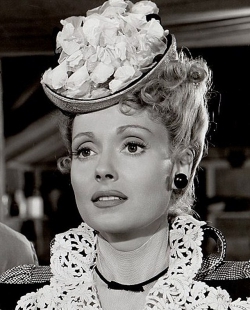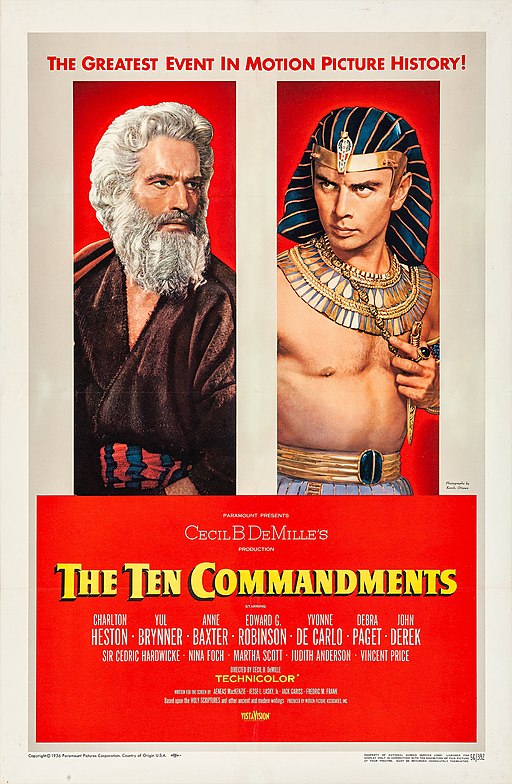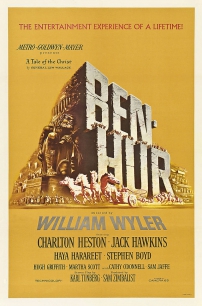Martha Scott
back| Full Name | Martha Ellen Scott |
| Stage Name | Martha Scott |
| Born | September 22, 1912 |
| Birthplace | Jamesport, Missouri, USA |
| Died | May 28, 2003 |
| Buried | Jamesport Masonic Cemetery, Jamesport, Missouri, USA |
| Married to | Mel Powell (composer) – married 1946, divorced - Jerome Toobin (television executive) – married until his death in 1984 |
| Children | Carlton Scott (from her marriage to Mel Powell) |
| Notable films | Our Town (1940) - The Howards of Virgina (1940) - The Ten Commandments (1956) - Ben-Hur (1959) |
Martha Scott
Biography and Film Career
Martha Scott (1912–2003) was an acclaimed American actress known for her emotional depth and poise. Born in Jamesport, Missouri, she trained in drama at the University of Michigan and rose to fame with her Oscar-nominated performance as Emily in Our Town (1940).
She became a familiar face in classic films such as The Ten Commandments and Ben-Hur, often portraying strong, compassionate maternal figures. On television, she had recurring roles in Dallas, The Six Million Dollar Man, and The Bionic Woman.
A co-founder of Plays for Living, she was also a producer committed to socially conscious storytelling. Married twice and mother to one son, Scott remained active in the arts until late in life. She died at age 90 of natural causes, leaving behind a legacy of dignified, heartfelt performances on stage and screen.
Related
Martha Scott (1912 – 2003)
The First Lady of Poised Emotion
A Life in Character and Grace
Martha Ellen Scott was born on September 22, 1912, in the small farming town of Jamesport, Missouri, where simplicity, discipline, and community shaped her early worldview. Her father, Walter Alva Scott, was a garage operator and local businessman, while her mother, Letha McKinley Scott, worked as a schoolteacher—instilling in Martha a deep respect for education and the arts. Raised in a modest but intellectually curious home, Martha found herself drawn to performance from an early age, often entertaining family and friends with dramatizations and storytelling.
Education and Early Passion for Drama
After graduating from Jamesport High School, Martha enrolled at the University of Michigan, where she studied drama and earned a degree in 1934. While at Michigan, she honed her skills onstage, participating in numerous university productions. Her training during this formative time would become the bedrock of her later success—combining classical technique with emotional authenticity.
Following college, she gained experience in regional theater and stock companies, including performances at the Century of Progress Exposition in Chicago. These early years were marked by perseverance and steady growth. She worked behind the scenes as well, learning the workings of theater production—knowledge that would later serve her in producing roles.
Breakthrough with Our Town
Martha's big break came on Broadway with the role of Emily Webb in Thornton Wilder’s Our Town. Her performance as the bright-eyed, idealistic young woman confronting mortality struck a chord with audiences and critics alike. When Hollywood adapted the play into a film in 1940, she was the only stage cast member to reprise her role, and her powerful performance earned her an Academy Award nomination for Best Actress—an extraordinary achievement for a screen newcomer.
A Career of Heartfelt Roles
Martha Scott quickly established herself in Hollywood as an actress of depth, sincerity, and quiet strength. She often portrayed wives, mothers, and women of moral fortitude in films that ranged from historical dramas to biblical epics. Some of her most memorable roles included:
- “The Howards of Virginia” (1940), opposite Cary Grant
- “Cheers for Miss Bishop” (1941), a heartfelt story of a dedicated teacher
- “In Old Oklahoma” (1943), with John Wayne
- “The Desperate Hours” (1955), a tense hostage thriller with Humphrey Bogart
- “The Ten Commandments” (1956), where she portrayed Yochabel, the mother of Moses
- “Ben-Hur” (1959), in the role of Miriam, mother of Judah Ben-Hur
In these films, she brought a rare emotional clarity to each character, embodying love, sacrifice, and inner courage.
Television and Stage Work
As the golden age of film transitioned into the television era, Scott adapted gracefully, becoming a familiar face on the small screen. She appeared in numerous series such as Perry Mason, Gunsmoke, Murder, She Wrote, The Love Boat, and more.
Not content to remain solely in front of the camera, she also co-founded Plays for Living in 1959, a theater initiative dedicated to social awareness, family values, and interpersonal understanding. She also helped co-found National Telefilm Associates, which further reflected her entrepreneurial and creative spirit.
Marriages and Family Life
Martha Scott’s personal life was one of both joy and loss. She married composer Mel Powell in 1946, a brilliant musician who later won the Pulitzer Prize for Music. The couple had one son, Carlton Powell, but the marriage ended in divorce.
Later, she married Jerome Toobin, a television executive with CBS and the father of journalist Jeffrey Toobin from a prior marriage. Martha and Jerome shared a quiet, enduring relationship that lasted until his death in 1984. Through both marriages, she maintained a strong devotion to family and upheld a reputation for kindness and professionalism within the industry.
Passions Beyond the Screen
In addition to her acting, Scott was passionate about theater education, philanthropy, and the promotion of the arts. She championed projects that dealt with real human dilemmas, often using performance as a vehicle for empathy and social dialogue. She was a trailblazer in advocating for meaningful roles for women, both in front of and behind the scenes.
Her quiet demeanor often masked a fierce intelligence and commitment to causes she believed in. She never sought the spotlight for its own sake, preferring instead to let her work—and her values—speak for her.
Final Years and Legacy
Martha Scott remained active in the arts well into her later years, occasionally appearing in films and on television even as she transitioned to more personal pursuits. She passed away from natural causes on May 28, 2003, in Van Nuys, California, at the age of 90. Her passing marked the end of a rich, disciplined life lived with dignity and creativity.
She was laid to rest in the Jamesport Masonic Cemetery in her beloved hometown in Missouri, returning to the place where her journey began.
Personal Features
Martha Scott was known for her graceful and poised presence, both on and off screen. While exact measurements are not widely documented, she stood approximately 5 feet 4 inches (1.63 meters) tall.
Her appearance was characterized by classic 1940s elegance: expressive eyes, refined features, and a dignified bearing that made her a natural fit for roles requiring emotional depth and maternal warmth.
Video Tribute to Martha Scott
Martha Scott: A Study in Graceful Realism
Martha Scott’s acting style was marked by an unmistakable blend of dignity, emotional sincerity, and restraint, rooted in the classical training she received during her academic years and early stage career. She was never a flamboyant performer; instead, she excelled in understated, psychologically rich portrayals of women often caught between duty and inner longing.
Emotional Authenticity
At the core of Scott’s acting was her ability to convey deep emotion with subtle physical cues rather than theatrical flourishes. Whether portraying the gentle optimism of Emily in Our Town or the quiet anguish of Miriam in Ben-Hur, she rarely needed to raise her voice or overplay a scene. Her face, voice, and posture did the work—inviting the audience to lean in, rather than sit back. She possessed a deliberate calmness, allowing her characters’ truths to emerge naturally and believably.
Voice and Delivery
Scott’s voice had a clear, composed quality, lending her a sense of maternal warmth and moral authority. She rarely indulged in melodrama; instead, her delivery was measured, articulate, and resonant. Her tone often projected inner strength, making her ideal for roles that required quiet resilience—mothers, wives, teachers, or spiritual figures—people who anchored their families or communities through grace under pressure.
Physical Presence
She brought a kind of graceful containment to her physical acting. On stage and screen, her posture was poised, her gestures minimal but expressive. She could hold a room’s attention simply by standing still. In dramatic moments, she often opted for a slight tilt of the head, a hand to the chest, or a fleeting glance to signal deep emotional shifts—small choices with great impact.
Character Work and Role Choices
Scott specialized in characters defined by emotional intelligence, moral clarity, and inner conflict. She brought warmth and depth to roles that might otherwise be one-dimensional. In The Ten Commandments, for example, her portrayal of Moses’ mother could have easily been overshadowed by spectacle, but Scott imbued the role with such conviction and maternal strength that it remained memorable amid a cast of giants.
Her choices in both film and television consistently favored women with emotional complexity. Whether playing a lonely teacher (Cheers for Miss Bishop), a frontier wife (The Howards of Virginia), or a mother losing her son to divine destiny (The Ten Commandments), Scott always approached the role with intellectual depth and respect for the character’s humanity.
Stage Influence on Screen Work
Her stage training was always evident in her disciplined timing, strong sense of scene structure, and awareness of space. Yet, she knew how to modulate her style for the camera—never too theatrical, always grounded. She seemed instinctively aware of the emotional distance between audience and performer and adjusted her energy accordingly, maintaining a compelling naturalism that never felt forced.
Legacy of Style
Martha Scott’s acting belongs to a tradition of performers who believed in serving the story rather than stealing the scene. She was not a “star” in the modern, ego-driven sense, but an actor in the truest form: one who listened deeply, reacted authentically, and built her characters from the inside out. In many ways, her style paved the way for later generations of film and television actresses who prioritize truth over technique and presence over persona.
Awards and Recognition
Academy Award Nomination
- 1941: Nominated for the Academy Award for Best Actress for her role as Emily Webb in Our Town (1940). This performance marked her film debut and garnered critical acclaim.
Hollywood Walk of Fame
- Honored with a star on the Hollywood Walk of Fame at 6126 Hollywood Boulevard, recognizing her significant contributions to the motion picture industry.
Stage and Production Contributions
- While specific awards for her stage work are not detailed in the available sources, Martha Scott's theatrical achievements include:
- Originating the role of Emily Webb in the Broadway production of Our Town in 1938.
- Co-founding the Plumstead Theatre Company in 1968 alongside Henry Fonda and Robert Ryan, which produced notable works such as First Monday in October.
Personal Quote by Martha Scott
- “Do not make the mistake of treating your dogs like humans or they will treat you like dogs.”
Memorable On-Screen Lines
As Emily Webb in Our Town (1940):
- “Wait! One more look. Goodbye. Goodbye, world! Goodbye, Grover's Corners. Mama and Papa. Goodbye to clocks ticking, my butternut tree, and Mama's sunflowers.”
As Yochabel in The Ten Commandments (1956):
- Yochabel: “Why have you come here?”
Bithiah: “Because Moses will come here.”
Yochabel: “My son?”
Bithiah: “No, my son!”
Yochabel: “My lips might deny him, but my eyes never could.
Martha Scott Movies
1940
- Our Town
Scott portrays Emily Webb in this adaptation of Thornton Wilder's play, depicting life and mortality in a small New England town. Her performance earned her an Academy Award nomination for Best Actress. - The Howards of Virginia
She plays Jane Peyton-Howard in this historical drama about a Virginian family's experiences during the American Revolution.
1941
- Cheers for Miss Bishop
As Ella Bishop, Scott depicts a dedicated teacher reflecting on her life and career in a small Midwestern town. - They Dare Not Love
In this wartime drama, she plays Marta Keller, involved in a romantic entanglement amidst the backdrop of World War II. - One Foot in Heaven
Scott portrays Hope Morris Spence, the supportive wife of a Methodist minister navigating the challenges of his vocation.
1943
- Stage Door Canteen
Appearing as herself, Scott is among numerous stars entertaining troops at the famed New York venue during World War II. - Hi Diddle Diddle
She plays Janie Prescott Phyffe in this musical comedy involving a newlywed couple and a series of comedic mishaps. - In Old Oklahoma (also known as War of the Wildcats)
Scott portrays Catherine Elizabeth Allen in this Western about oil drilling conflicts in early 20th-century Oklahoma.
1947
- So Well Remembered
As Olivia, she stars in this British drama chronicling a man's life and the societal changes in his English town.
1949
- Strange Bargain
Scott plays Georgia Wilson in this film noir about an accountant entangled in a murder plot.
1951
- When I Grow Up
She portrays Mother Reed in this coming-of-age story reflecting on childhood and family life.
1955
- The Desperate Hours
Scott plays Eleanor "Ellie" Hilliard, a mother whose family is taken hostage by escaped convicts in their suburban home.
1956
- The Ten Commandments
In this biblical epic, she portrays Yochabel, the mother of Moses, who saves her son from Pharaoh's decree.
1957
- Eighteen and Anxious
Scott plays Lottie Graham in this drama about a young woman's struggles with societal expectations and personal desires. - Sayonara
She portrays Mrs. Webster in this romantic drama about an American Air Force pilot's forbidden love in post-war Japan.
1959
- Ben-Hur
Scott plays Miriam, the mother of Judah Ben-Hur, in this historical epic set during the time of Christ.
1973
- Charlotte's Web
In this animated adaptation, she provides the voice for Mrs. Arable, the mother of the young girl who saves Wilbur the pig.
1974
- Airport 1975
Scott portrays Sister Beatrice, a nun aboard a commercial flight that faces disaster after a mid-air collision.
1977
- The Turning Point
She plays Adelaide in this drama about the world of ballet and the personal sacrifices of its performers.
1981
- First Monday in October
Scott makes an uncredited cameo in this film about the first female U.S. Supreme Court Justice and her ideological clashes with a conservative colleague.
1988
- Doin' Time on Planet Earth
She portrays Virginia Camalier in this comedy about a teenager's imaginative escape from his mundane life.
Television Series
1950s–1960s: Early Television Appearances
- Robert Montgomery Presents (1950–1957): Scott appeared in multiple episodes of this anthology series, showcasing her versatility in various dramatic roles.
- Modern Romances (1954–1957): She served as the initial narrator and host for this daytime anthology series, bringing nighttime-quality storytelling to daytime audiences.
- Route 66 (1961–1962): Scott guest-starred in two episodes of this drama series that followed two young men traveling across America.
- The F.B.I. (1967): She appeared in an episode of this crime drama series, which was based on real FBI cases.
1970s: Recurring and Guest Roles
- The Bob Newhart Show (1972–1977): Scott had a recurring role as Mrs. Martha Hartley, Bob's mother, appearing in several episodes.
- The Six Million Dollar Man (1974–1975): She portrayed Helen Elgin, the mother of the protagonist, Steve Austin, in three episodes.
- The Bionic Woman (1976–1977): Reprising her role as Helen Elgin, Scott appeared in six episodes of this spin-off series.
- Dallas (1979–1985): In a recurring role, she played Patricia Shepard, the mother of Sue Ellen Ewing, appearing in ten episodes.
1980s: Diverse Appearances
- Secrets of Midland Heights (1980–1981): Scott was a series regular, portraying Margaret Millington in this short-lived primetime soap opera.
- Magnum, P.I. (1983): She guest-starred as Jeanie LaSalle in an episode of this detective series.
- General Hospital (1985–1986): Scott played Jennifer Talbot, a character involved in a dramatic storyline that concluded with her character's murder.
- Murder, She Wrote (1987): In a notable episode titled "The Days Dwindle Down," Scott reprised her role from the 1949 film "Strange Bargain," integrating original film footage into the episode's narrative.
Television Movies
- The Devil's Daughter (1973): Scott portrayed Mrs. Stone in this horror TV movie about a young woman drawn into a satanic cult.
- Thursday's Game (1974): She played Mrs. Reynolds in this comedy-drama about two friends navigating life's challenges.
- The Abduction of Saint Anne (1975): Scott took on the role of Mother Michael in this suspenseful TV movie.
- Summer Girl (1983): She appeared as Martina Shelburne in this drama about a family's encounter with a mysterious young woman.
- Adam (1983) and Adam: His Song Continues (1986): Scott portrayed Gram Walsh in these TV movies based on the true story of a kidnapped child and his family's quest for justice.
- Daughter of the Streets (1990): In her final television role, Scott played Sarah in this drama about a mother searching for her runaway daughter.










